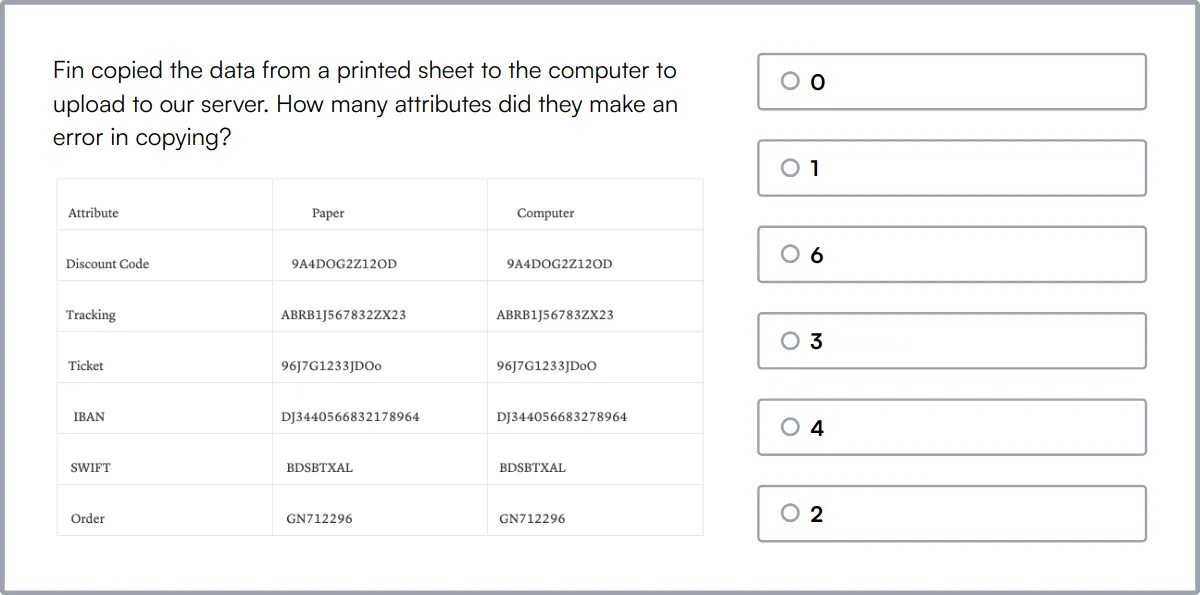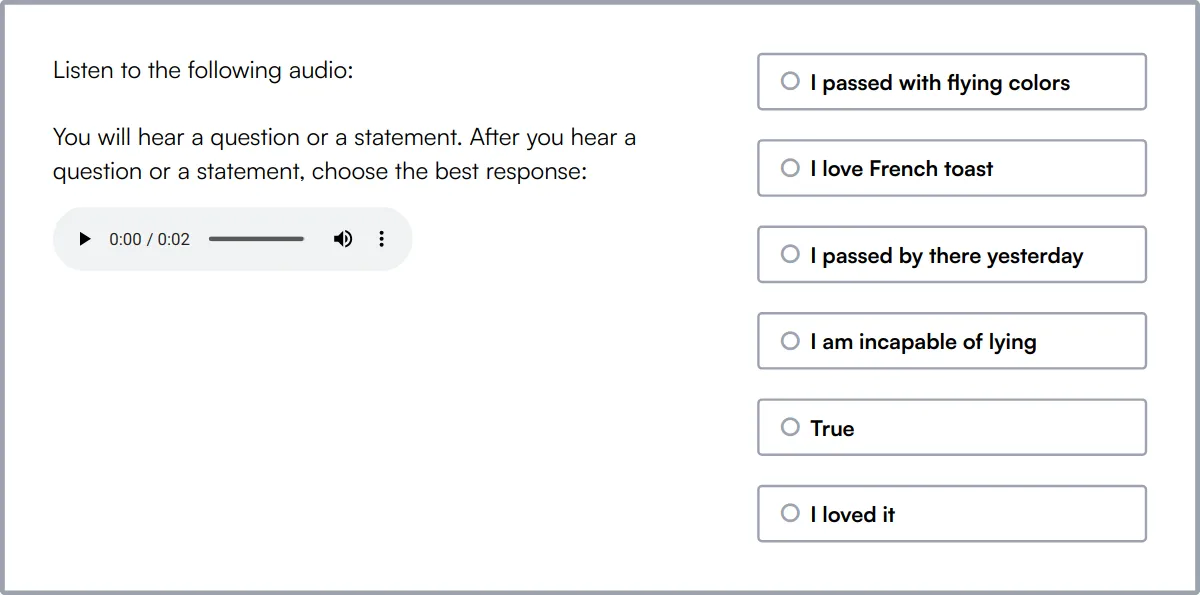Pharmacists play a crucial role in patient healthcare by ensuring the safe and effective use of medication. They serve as the critical link between patients and their prescriptions, providing guidance and expertise on drug interactions, side effects, and proper dosages.
Skills required for a pharmacist include a deep knowledge of pharmaceuticals, excellent communication, attention to detail, and the ability to interact with both patients and healthcare professionals. Assessing these skills involves evaluating both their technical knowledge and their interpersonal abilities.
Candidates can write these abilities in their resumes, but you can’t verify them without on-the-job Pharmacist skill tests.
In this post, we will explore 7 essential Pharmacist skills, 7 secondary skills and how to assess them so you can make informed hiring decisions.
Table of contents
7 fundamental Pharmacist skills and traits
The best skills for Pharmacists include Medication Knowledge, Pharmaceutical Calculations, Attention to Detail, Patient Counseling, Regulatory Compliance, Interpersonal Communication and Inventory Management.
Let’s dive into the details by examining the 7 essential skills of a Pharmacist.

Medication Knowledge
A pharmacist needs an in-depth understanding of various medications, including their uses, dosages, side effects, and interactions. This knowledge enables them to advise patients accurately and ensure safe and effective use of prescriptions.
For more insights, check out our guide to writing a Pharmacist Job Description.
Pharmaceutical Calculations
Precision in pharmaceutical calculations is key for a pharmacist to determine the correct dosage and compound formulations. Mistakes in these calculations can lead to ineffective treatment or dangerous drug interactions.
Attention to Detail
Pharmacists must have a meticulous eye for detail to avoid medication errors, check prescriptions for accuracy, and verify patient information. This skill is crucial in preventing harmful mistakes in medication dispensing.
Check out our guide for a comprehensive list of interview questions.
Patient Counseling
The ability to effectively counsel patients about their medications and health concerns is a critical skill. Pharmacists should convey complex information in a clear, understandable manner to help patients manage their conditions and follow treatment plans.
Regulatory Compliance
Pharmacists must ensure that they adhere to all laws and regulations governing pharmacy practice. This involves staying updated on legal requirements and applying them in daily operations to protect patient safety and maintain professional standards.
Interpersonal Communication
Excellent communication skills are necessary for interacting with patients, healthcare providers, and insurance companies. A pharmacist uses this skill to build rapport, resolve issues, and guide patients in their healthcare journey.
Inventory Management
Managing pharmaceutical inventory is essential for ensuring a pharmacy is well-stocked without overstocking. Pharmacists need skills to monitor drug levels, order supplies, and handle expired medications efficiently.
7 secondary Pharmacist skills and traits
The best skills for Pharmacists include Data Entry, Problem Solving, Time Management, Technical Literacy, Team Collaboration, Customer Service and Cultural Competency.
Let’s dive into the details by examining the 7 secondary skills of a Pharmacist.

Data Entry
Pharmacists often need to input and maintain accurate prescription and patient records in electronic systems. Proficiency in data entry helps ensure that records are kept up-to-date and errors are minimized.
Problem Solving
Pharmacists must be adept at resolving issues, such as insurance claim denials or medication discrepancies. They need to investigate and find solutions to provide uninterrupted patient care.
Time Management
Handling numerous prescriptions and patient queries efficiently requires strong time management skills. Pharmacists need to prioritize tasks and ensure they meet patient needs promptly.
Technical Literacy
Familiarity with pharmacy management software and other digital tools is helpful. Being technically literate enables pharmacists to efficiently manage prescriptions and patient data.
Team Collaboration
Working well with other healthcare professionals, such as doctors and nurses, is a key part of a pharmacist's role. Effective collaboration ensures cohesive patient care and integrated health services.
Customer Service
Providing excellent customer service sets pharmacists apart as healthcare providers. They must handle patient inquiries, offer advice, and maintain a welcoming environment in the pharmacy.
Cultural Competency
Pharmacists benefit from understanding and respecting diverse cultural backgrounds. This skill helps tailor communication and approach to meet the varied needs of patients.
How to assess Pharmacist skills and traits
Assessing the skills and traits of a pharmacist goes beyond just credentials and certifications. It is a comprehensive process that examines a candidate's practical abilities and problem-solving techniques in real-world situations. While medication knowledge and attention to detail remain fundamental, it's also important to evaluate how well pharmacists can communicate with patients and collaborate with healthcare teams.
Traditional hiring methods may not fully capture the depth of a pharmacist's capabilities. This is where skills-based assessments come into play. These evaluations provide a clearer picture of how a candidate might perform in patient counseling, regulatory compliance, or inventory management — areas that are crucial to the role of a pharmacist. Using platforms like Adaface on-the-job skill tests can significantly streamline the hiring process, offering an 85% reduction in screening time and ensuring an improved quality of hires.
Let’s look at how to assess Pharmacist skills with these 5 talent assessments.
Pharmacist Test
Our Pharmacist Test evaluates a candidate's expertise in key pharmacy domains such as prescription analysis, drug interactions, and patient counseling. Scenario-based MCQs assess knowledge in pharmacokinetics, pharmacodynamics, and pharmaceutical calculations, ensuring candidates can apply concepts in real-world settings.
The test covers areas like drug formulation, pharmaceutical chemistry, and therapeutics, focusing on clinical pharmacy best practices. Candidates must interpret prescriptions, recognize potential drug interactions, and offer effective patient counseling.
High-scoring candidates demonstrate a comprehensive understanding of pharmaceutical care principles and the ability to tackle complex clinical scenarios.
Pharmacy Technician Test
Our Pharmacy Technician Test assesses candidates on pharmacy regulations, medication preparation, and inventory management. It uses MCQs to gauge understanding of pharmacology, patient safety, and communication in pharmacy settings.
This test measures proficiency in pharmacy calculations, OTC medications, and pharmacy ethics. It requires knowledge of healthcare systems, insurance, and sterile compounding.
Top candidates understand pharmacy laws, communicate effectively in professional environments, and manage medications safely.
Attention To Detail Test
Our Attention to Detail Test evaluates a candidate's focus and thoroughness in detail-oriented work. The test is designed to identify candidates who can spot errors and ensure high quality when processing information.
It assesses skills in following instructions, checking consistency, and proofreading to verify accuracy in data entry and document review.
Candidates who excel demonstrate a meticulous approach to tasks, ensuring precision and reliability in their work output.

HIPAA Test
Our HIPAA Test evaluates a candidate's understanding of HIPAA's rules and regulations. Scenario-based MCQs assess knowledge of privacy and security aspects crucial for roles involving healthcare data protection.
The test covers HIPAA compliance, data encryption, and patient rights, requiring familiarity with business associate agreements and breach notification rules.
Successful candidates demonstrate an ability to navigate HIPAA protocols and protect sensitive health information.
Listening Comprehension Test
Our Listening Comprehension Test evaluates a candidate's ability to process and analyze auditory information. Through scenario-based MCQs, it assesses active listening and comprehension skills.
The test requires understanding the speaker's intent, paraphrasing, and asking clarifying questions. It assesses the ability to retain information and distinguish facts from opinions.
Candidates who perform well show proficiency in engaging with complex information and communicating effectively.

Summary: The 7 key Pharmacist skills and how to test for them
| Pharmacist skill | How to assess them |
|---|---|
| 1. Medication Knowledge | Evaluate understanding and application of drug information and interactions. |
| 2. Pharmaceutical Calculations | Test precision in performing dosing and formula-related calculations. |
| 3. Attention to Detail | Check accuracy in verifying prescriptions and detecting potential errors. |
| 4. Patient Counseling | Observe ability to effectively communicate medication information to patients. |
| 5. Regulatory Compliance | Assess adherence to legal and industry standards in pharmaceutical practices. |
| 6. Interpersonal Communication | Evaluate clarity and professionalism in interactions with patients and team. |
| 7. Inventory Management | Review skills in tracking and managing pharmaceutical stocks. |
Pharmacist Test
Pharmacist skills FAQs
How can recruiters assess a candidate's medication knowledge for a pharmacist role?
Recruiters can assess medication knowledge through scenario-based questions, asking candidates to explain the mechanisms of action, interactions, and side effects of commonly prescribed medications.
What methods can be used to evaluate pharmaceutical calculation skills?
Pharmaceutical calculation skills can be assessed by providing candidates with real-world dosage calculations or dilution problems to solve during the interview process.
How important is attention to detail in pharmacy practice, and how can it be tested?
Attention to detail is critical in pharmacy. It can be evaluated by asking candidates to review a mock prescription for errors or inconsistencies.
What questions can assess a pharmacist's patient counseling skills?
Ask candidates to role-play a counseling session, explaining how they would communicate medication instructions and address patient concerns.
How do recruiters test regulatory compliance knowledge in pharmacists?
Regulatory compliance can be tested by questioning candidates on their understanding of local, state, and federal pharmacy laws and regulations.
What are effective ways to gauge a pharmacist's inventory management skills?
Inventory management skills can be assessed by asking candidates to describe their experience with inventory systems and how they manage stock levels and expirations.
Why is cultural competency important for pharmacists, and how can it be evaluated?
Cultural competency is important for understanding and respecting diverse patient backgrounds. Evaluate by asking candidates how they adapt communication styles for different cultural contexts.
How can one assess a pharmacist's time management abilities during an interview?
Assess time management by asking candidates to describe how they prioritize tasks and handle high-pressure situations in a busy pharmacy setting.

40 min skill tests.
No trick questions.
Accurate shortlisting.
We make it easy for you to find the best candidates in your pipeline with a 40 min skills test.
Try for freeRelated posts
Free resources



